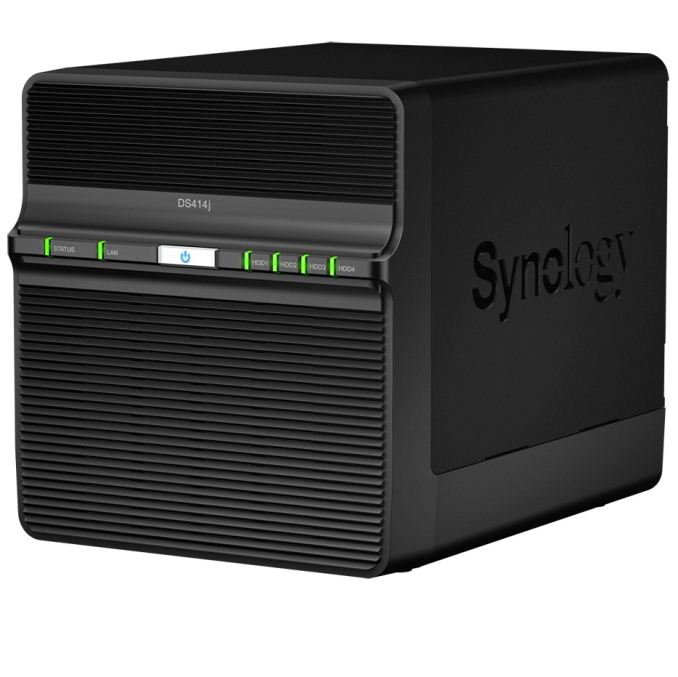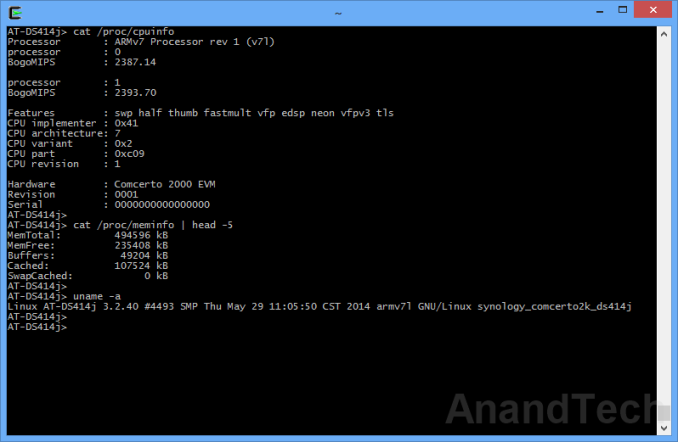Synology DS414j: An Ideal Backup NAS
by Ganesh T S on July 10, 2014 9:00 AM EST
Introduction
The consumer Network Attached Storage (NAS) market has seen tremendous growth over the past few years. As the amount of digital media generated by the average household increases, 4-bay solutions based on ARM platforms are turning out to be quite attractive for home users. Low cost and power efficiency are some of the positives for these types of solutions.
Synology targets the average home user market with the j-series models. These units have traditionally provided consumers with a very budget-friendly entry-level window into the DSM (Disk Station Manager) ecosystem. With drive capacities on the increase, we have seen people move to 4-bay NAS units in order to take advantage of RAID-10 (despite the loss of effective storage space). This helps to avoid (to a certain extent) risk-prone rebuilds associated with RAID-5 arrays. We have already evaluated solutions from Western Digital (WD EX4) and LenovoEMC (ix4-300d) in this space. In late April this year, Synology introduced the DS414j to provide consumers with an alternative in this market segment.
Western Digital and LenovoEMC's solutions are based on Marvell SoCs, but Synology bucks the trend by opting for a Mindspeed Comcerto C2200 dual-core communications processor in the DS414j. The SoC has two Cortex-A9 cores running at 1.2 GHz and plenty of hardware acceleration engines. The other specifications of the DS414j are provided in the table below.
| Synology DS414j Specifications | |
| Processor | Mindspeed Comcerto 2000 (2x Cortex-A9 @ 1.2 GHz) |
| RAM | 512 MB DDR3 RAM |
| Drive Bays | 4x 3.5"/2.5" SATA 6 Gbps HDD / SSD (No Hot-Swap) |
| Network Links | 1x 1 GbE |
| External I/O Peripherals | 1x USB 3.0 / 1x USB 2.0 |
| Expansion Slots | None |
| VGA / Display Out | None |
| Full Specifications Link | Synology DS414j Full Specifications |
| Price | $417 |
The DS414j runs Linux (kernel version 3.2.40). Other aspects of the platform can be gleaned by accessing the unit over SSH.
Testbed Setup and Testing Methodology
The Synology DS414j is a 4-bay unit. Users can opt for either JBOD, RAID 0, RAID 1, RAID 5, RAID 6 or RAID 10 configurations. We benchmarked the unit in RAID 5 with four Western Digital WD4000FYYZ RE drives as the test disks. Our testbed configuration is outlined below.
| AnandTech NAS Testbed Configuration | |
| Motherboard | Asus Z9PE-D8 WS Dual LGA2011 SSI-EEB |
| CPU | 2 x Intel Xeon E5-2630L |
| Coolers | 2 x Dynatron R17 |
| Memory | G.Skill RipjawsZ F3-12800CL10Q2-64GBZL (8x8GB) CAS 10-10-10-30 |
| OS Drive | OCZ Technology Vertex 4 128GB |
| Secondary Drive | OCZ Technology Vertex 4 128GB |
| Tertiary Drive | OCZ Z-Drive R4 CM88 (1.6TB PCIe SSD) |
| Other Drives | 12 x OCZ Technology Vertex 4 64GB (Offline in the Host OS) |
| Network Cards | 6 x Intel ESA I-340 Quad-GbE Port Network Adapter |
| Chassis | SilverStoneTek Raven RV03 |
| PSU | SilverStoneTek Strider Plus Gold Evoluion 850W |
| OS | Windows Server 2008 R2 |
| Network Switch | Netgear ProSafe GSM7352S-200 |
Thank You!
We thank the following companies for helping us out with our NAS testbed:
- Thanks to Intel for the Xeon E5-2630L CPUs and the ESA I-340 quad port network adapters
- Thanks to Asus for the Z9PE-D8 WS dual LGA 2011 workstation motherboard
- Thanks to Dynatron for the R17 coolers
- Thanks to G.Skill for the RipjawsZ 64GB DDR3 DRAM kit
- Thanks to OCZ Technology for the two 128GB Vertex 4 SSDs, twelve 64GB Vertex 4 SSDs and the OCZ Z-Drive R4 CM88
- Thanks to SilverStone for the Raven RV03 chassis and the 850W Strider Gold Evolution PSU
- Thanks to Netgear for the ProSafe GSM7352S-200 L3 48-port Gigabit Switch with 10 GbE capabilities.
- Thanks to Western Digital for the two WD RE hard drives (WD4000FYYZ) to use in the NAS under test.











41 Comments
View All Comments
Andrew911tt - Thursday, July 10, 2014 - link
I was dealing with the exact same thing and ended up building my own based on the Intel J1900total cost for me was $400
https://forums.plex.tv/index.php/topic/107967-anyo...
http://hardforum.com/showthread.php?t=1825843
embeddedGPU - Thursday, July 10, 2014 - link
I just want to mention that Mindspeed's CPE processor business has been acquired by Freescale and the Comcerto C2200 is now the Freescale LS1024Acolinstu - Thursday, July 10, 2014 - link
Absolutely love my DS412+!basroil - Thursday, July 10, 2014 - link
That iSCSI performance is really lackluster considering the ratio to CIFS performance of other drives. But given that this one's an ARM system rather than Atom, perhaps the device is optimized for multiple users?peterfares - Friday, July 11, 2014 - link
So many NAS reviews lately! Thorough as always!Andy Chow - Friday, July 11, 2014 - link
Since you guys have 12 x OCZ Technology Vertex 4 64GB laying around, could you run a benchmark with SSD? In general all NAS should be benchmarked with SSD.A SSD would show the bottlenecks of the device itself.
I really wonder if cheap devices like these could really become fast enough and scalable to replace commercial systems.
gorbag - Saturday, July 12, 2014 - link
"A SSD would show the bottlenecks of the device itself." -- Andy ChowSort of. One device might be better at using drives in parallel than another - a difference that would disappear with extremely fast drives. But if you intend to use the NAS with SSDs then of course SSD benchmarks would be more useful to you.
Conficio - Monday, July 14, 2014 - link
"for example, DS414j and jx4-300d both don't support hot-swap" type "ix4-300d" ?brifin5 - Friday, July 18, 2014 - link
You can use Long Path Tool as well.carage - Monday, August 4, 2014 - link
I was inclined to buy a Synology NAS device recently, until I heard of thing called SynoLocker. I would think twice before there is an official solution to this problem.